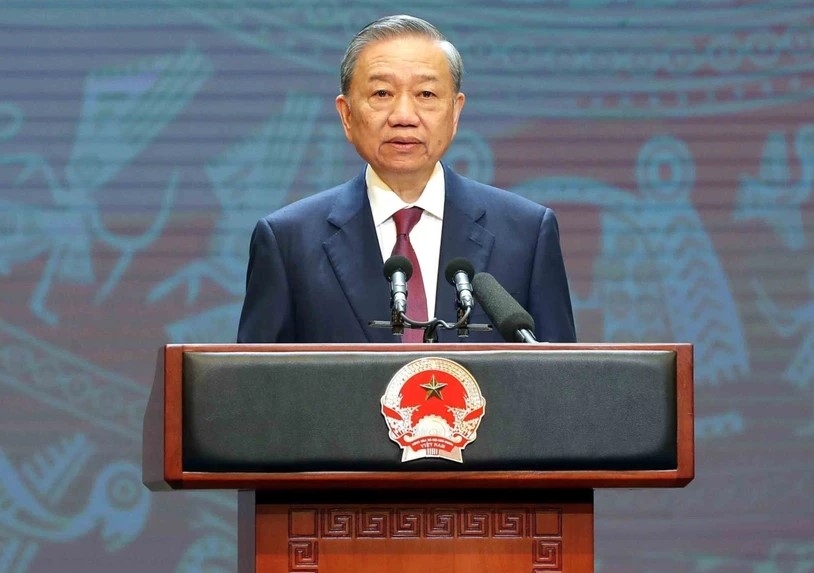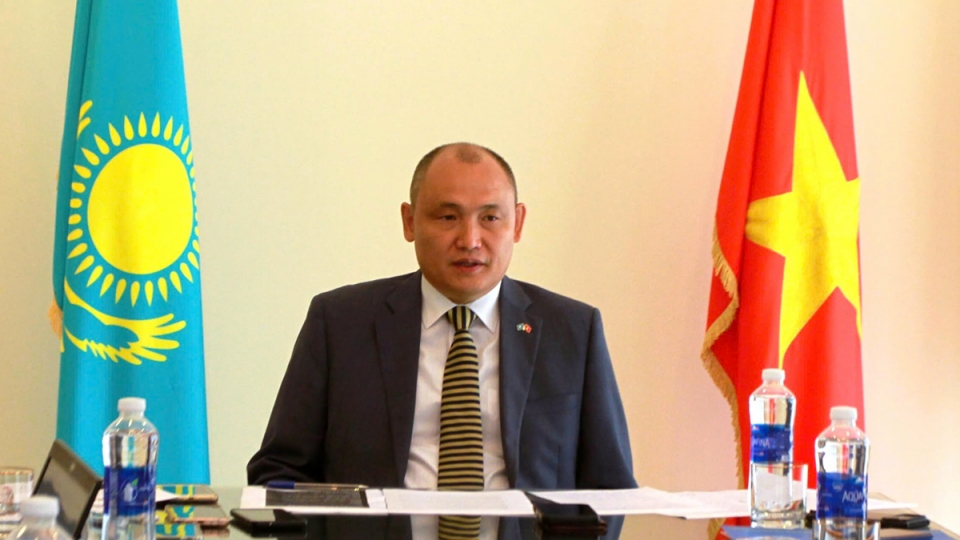Top leader's visit to bolster Vietnam-Kazakhstan cooperation
The upcoming state visit to Kazakhstan by Party General Secretary To Lam and his spouse is expected to open new avenues for cooperation and further deepen the relationship between Vietnam and the Central Asian nation.

Kazakhstan is the first stop on General Secretary Lam’s tour to four countries, including Azerbaijan, Russia and Belarus, from May 5 to 12. This marks the first state visit to Kazakhstan by a top Vietnamese leader in 13 years, and notably the first ever by a General Secretary of the Communist Party of Vietnam.
The visit from May 5-7 comes at a time when traditional friendship and multifaceted cooperation between Vietnam and Kazakhstan are experiencing positive development. It is expected to further strengthen bilateral ties across numerous fields.
Robust political-diplomatic ties
Vietnam and Kazakhstan established diplomatic relations on June 29, 1992. Since then, their traditional friendship has been steadily strengthened and expanded. Vietnam officially opened its embassy in Kazakhstan in July 2008, while Kazakhstan opened its embassy in Vietnam on March 30, 2015.
There has been a consistent exchange of high-level visits. On the Vietnamese side, notable visits to Kazakhstan include those by Prime Minister Vo Van Kiet in June 1994, Prime Minister Nguyen Tan Dung in September 2009 and again in May 2015 for the official signing of the Vietnam–Eurasian Economic Union (EAEU) Free Trade Agreement, President Truong Tan Sang in April 2012, and National Assembly Chairwoman Nguyen Thi Kim Ngan in October 2017.
From Kazakhstan, visits to Vietnam include those by President Nursultan Nazarbayev in October 2011, Speaker of the Mazhilis (Lower House) Zhakupov Kabibolla Kabenovich in March 2015, Speaker Nurlan Nigmatulin in November 2019, Deputy Prime Minister and Foreign Minister Mukhtar Tileuberdi in August 2022, and President Kassym-Jomart Tokayev in an official visit in August 2023.
The two countries have maintained bilateral cooperation mechanisms, such as Deputy Foreign Minister-level political consultations. The Vietnam–Kazakhstan Intergovernmental Committee on Economic, Trade, and Scientific-Technical Cooperation holds alternating meetings, with the latest 11th session taking place in Kazakhstan in May 2024.
Vietnam and Kazakhstan closely coordinate at multilateral forums and international organisations, especially the United Nations. Kazakhstan supported Vietnam’s candidacy for the UN Human Rights Council for the 2023–2025 term, the Executive Board of UNESCO, and the Intergovernmental Committee for the Safeguarding of the Intangible Cultural Heritage (2022–2026). Vietnam supported Kazakhstan’s membership in the Far East Group of the International Atomic Energy Agency (IAEA).
Sustained growth of economic-trade cooperation
Kazakhstan is Vietnam’s second-largest trade partner in the EAEU, following Russia. Meanwhile, Vietnam is Kazakhstan’s second-largest trade partner in ASEAN, after Singapore.
Bilateral trade turnover reached US$349.2 million in 2020, US$622.8 million in 2021, and US$584 million in 2022. In 2023, two-way trade stood at US$401.8 million, and by 2024, it had surged to US$800 million - an increase of 99% year-on-year.
Vietnam mainly exports mobile phones and components, machinery, computers, electronics, agricultural products such as rice, cashew nuts, and pepper, seafood, canned fruits and vegetables, clothing, and footwear to Kazakhstan. In return, Vietnam imports raw materials including unprocessed lead and zinc, stainless steel, and non-ferrous metal products.
According to Ambassador of Kazakhstan to Vietnam Kanat Tumysh, the two countries -both signatories to the Vietnam–EAEU Free Trade Agreement, effective since October 2016- enjoy multiple advantages for economic collaboration. For example, Vietnamese firms can boost exports of fruits and vegetables to the broader Central Asian region through Kazakhstan, which experiences harsh winters that hinder local agricultural production. Meanwhile, Kazakhstan can export its abundant and competitively priced beef and lamb to Vietnam, where these products are typically costly.
These prospects could be significantly enhanced by the development of a new rail transport corridor, the "Middle Corridor", connecting Vietnam with China, Kazakhstan, Azerbaijan, Turkey, and ultimately Europe.
Kazakhstan can serve as a strategic gateway for Vietnam to deepen economic and transport cooperation with the EAEU and Central Asia, expanding access to European markets.
In terms of investment, Kazakhstan currently has six foreign direct investment (FDI) projects in Vietnam with a combined registered capital of over US$500,000. On the other hand, two Vietnamese-run instant noodle enterprises are operating in Kazakhstan.
The two countries continue to strengthen cooperation in culture, tourism, education and training, transport, energy, local government exchange, and people-to-people diplomacy.
Regarding tourism, since September 2019, Kazakhstan has unilaterally waived visas for Vietnamese citizens for up to 30 days. The first direct flight between the two countries was launched in November 2022, and more routes have been added connecting popular tourist cities. In 2023, over 62,500 Kazakhstani tourists visited Vietnam, rising to 150,000 in 2024.
In education, a bilateral agreement was signed on September 15, 2009. Each year, both countries exchange three undergraduate scholarships on a reciprocal basis.
Cultural exchanges have included cultural days held in each other’s countries (in September 2012 and June 2013), the Vietnam Day in Kazakhstan event (August 2017) held as part of EXPO-2017 in Astana, and a performance by the Vietnam Symphony Orchestra in June 2017 to mark the 25th anniversary of diplomatic relations. In 2021, the Kazakhstan Embassy held Kazakh Film Days in Da Nang. In 2023, the two sides initiated a lecturer exchange programme in the field of music.
In scientific research, Kazakhstan seeks to collaborate with Vietnamese and other Asian scholars in studying the history, origins, and intercultural interactions of Asian civilisations.
The Vietnamese community in Kazakhstan numbers around 50 individuals, most of whom are settled, holding permanent residence cards and engaged in stable livelihoods. A small number are students or university lecturers on fixed-term contracts.
The state visit to Kazakhstan by General Secretary To Lam and his spouse, along with the high-level Vietnamese delegation, affirms the consistent policy of the Vietnamese Party and State to strengthen traditional friendships and comprehensive cooperation with friendly nations in Central Asia, the South Caucasus, and Eastern Europe. The visit is expected to give a boost to bilateral cooperation and generate more partnership opportunities.



